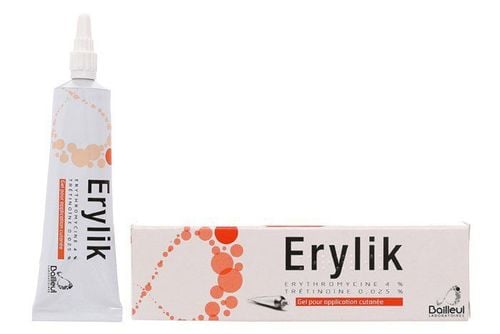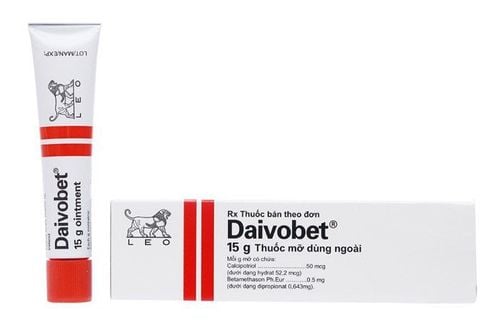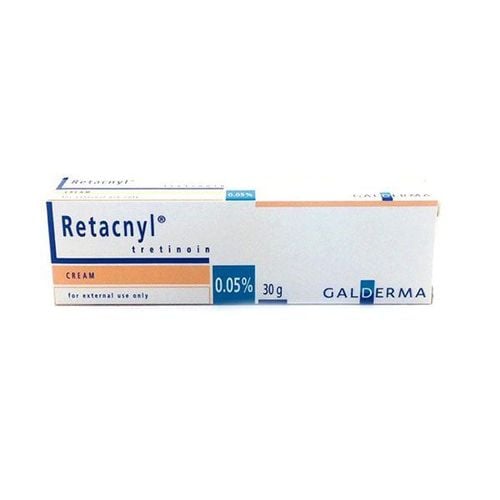Acnotin 20 mg is used in cases of acne that is severe or unresponsive to conventional acne treatments. This is a systemic medication, so it should be used with extreme caution.
1. Uses of Acnotin 20 mg
Each capsule contains 20mg of Isotretinoin (USP), the active ingredient.
Isotretinoin, a type of retinoid, is a systemic medication prescribed for the treatment of severe acne. While the precise mechanism of how isotretinoin works is not completely understood, it is known to reduce the size of oil-producing glands in the skin and decrease the amount of oil they produce. Additionally, isotretinoin has anti-inflammatory properties that help to reduce skin inflammation.
Acnotin is prescribed for patients with:
- Severe acne that requires a stronger treatment.
- Acne that has not improved with other acne medications or treatments.
- Acne that has caused noticeable scarring or disfigurement of the face, leading to significant emotional distress or difficulties in daily life.
2. Usage and dosage of Acnotin 20 mg
How to use: The drug is prepared in the form of tablets and taken orally.
Dosage:
Usual dose in adults and adolescents: Use 0.5-1mg/kg body weight per day (divided into two doses and taken with meals) for 15-20 weeks. The maximum dose is 2mg/kg body weight per day, this dose is applied to patients with very severe acne or acne that initially appeared on the chest or back instead of on the face. After about 4 weeks, the therapeutic effect will be seen, the maintenance dose should be adjusted in the range of 0.1 - 1mg/kg body weight per day, depending on the case. During the initial period of treatment with isotretinoin, if acne may appear slightly more frequent and transient, additional treatment with another method may be necessary. The drug is not suitable for the treatment of acne in children under 12 years of age.
3. When should Acnotin 20 mg not be used?
Acnotin 20mg is contraindicated in several conditions, including:
- Liver or kidney disease, vitamin A toxicity, and high cholesterol.
- Patients with a history of allergy to Isotretinoin or any component of the medication.
- Concomitant use with tetracycline antibiotics.
- Are pregnant, planning to become pregnant, or breastfeeding.
Warning: Due to the risk of birth defects, blood from patients who have recently taken Isotretinoin should not be used for blood transfusions in pregnant women or women planning to become pregnant.
4. Side effects of Acnotin 20 mg
Possible undesirable effects when taking Acnotin 20 include:
- Vitamin A toxicity symptoms: Dry skin and mucous membranes, cracked lips, nosebleeds, conjunctivitis, reversible corneal opacities, and intolerance to contact lenses..
- Skin reactions: Rashes, dermatitis, itching, sweat gland disorders, inflammation around nails, nail thinning, hair loss, increased acne, excessive hair growth, skin discoloration, and increased sensitivity to sunlight
- Musculoskeletal: Muscle aches, joint pain, tendonitis, and other bone-related changes.
- Neurological and psychiatric: Behavioral changes, depression, headaches, increased intracranial pressure, seizures.
- Sensory: Visual disturbances, hearing loss, light sensitivity, night blindness, cataracts, and corneal inflammation.
- Gastrointestinal: Colitis, hemorrhagic ileitis
- Liver: Temporary increases in liver enzymes, which usually return to normal during treatment. In some cases, hepatitis may occur, necessitating a reduction in dosage or discontinuation of the medication.
- Other: Bronchospasm, decreased white blood cells, decreased red blood cells, increased or decreased platelets, increased sedimentation rate, increased cholesterol and triglycerides, increased uric acid, and local or systemic infections.
If you experience any of these side effects, it is important to inform your healthcare provider so that appropriate adjustments to your treatment can be made.
5. Precautions when using Acnotin 20mg
- Do not become pregnant while taking Acnotin 20mg. There is a high risk of birth defects if you become pregnant while using this medication. Reliable birth control is essential during treatment.
- You should only take isotretinoin as prescribed by a dermatologist. It's crucial to understand the severe risks of birth defects associated with using this medication during pregnancy.
- Liver function tests should be conducted before starting treatment, one month after starting treatment, and every three months thereafter. Additionally, blood lipid levels should be checked before treatment, one month after starting treatment, and again after three months.
- Isotretinoin has been linked to mental health issues. Cases of depression, psychosis, suicidal thoughts, and suicide have been reported. If you have a history of depression, you should be closely monitored.
- Acne is linked to androgen hormone levels. Therefore, it's not recommended to use oral contraceptives containing androgen progesterone, such as 19-nortestosterone derivatives, concurrently.
- Do not exfoliate your skin during isotretinoin treatment or for 6 months after stopping treatment as it can increase the risk of scarring.
- For special patients: Close monitoring of clinical signs is necessary for those at high risk of side effects, such as patients with diabetes, obesity, alcohol abuse, or lipid metabolism disorders who are being treated with isotretinoin.
- Blood glucose levels should be monitored regularly in patients with or suspected of having diabetes. Although a direct link has not been established, there have been reports of rapid increases in blood glucose levels, which can lead to pancreatitis, enteritis, ear problems, musculoskeletal issues, and even newly diagnosed diabetes in some cases while taking isotretinoin.
- Dry mouth, a common side effect, can lead to dental problems and worsen existing conditions such as cavities, gum disease, and fungal infections. To help alleviate these oral issues, you can use artificial saliva or sugar-free candies.
- You should limit direct sun exposure. If topical medications are needed, mild topical acne treatments can be used as an adjunct.
- Acnotin 20mg can interact with other medications such as low-dose progesterone and phenytoin.
- Acnotin 20 mg drug should be stored in a cool dry place, below 30°C. Avoid direct light and keep out of reach of children.
In summary, Acnotin 20 mg is a systemic drug and it is essentially a form of vitamin A, so there is a risk of causing an excess of vitamin A. So you do not arbitrarily use or use the wrong dose to avoid a negative impact on health.
Please dial HOTLINE for more information or register for an appointment HERE. Download MyVinmec app to make appointments faster and to manage your bookings easily.













